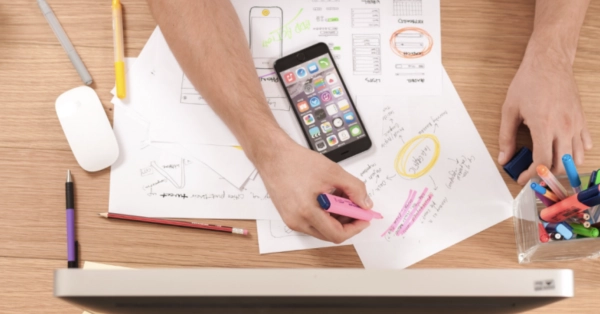You need a bank account to complete the company set-up process and to start doing business. Before choosing your banking services provider, you should understand in what situations you will need it, what facilities and services they offer and what differences exist between them.

The needs of your business will change as your business grows: if at first you will use your bank account mainly for making and receiving payments, in time you can start accessing other services: foreign currency exchange, loans, implementation of card payment on your website etc. You can learn all about this below.
1. Factors to consider when choosing a bank
Commissions, facilities, technical support and desire to meet the needs of SMEs - what matters most when deciding on the bank you will work with? If you don't know where to start with your research, we recommend a few things to keep in mind in this selection process.
Commissions - Depending on the activity you carry out, it would be a good idea to check the brochure of commissions charged for the following operations and, if necessary, ask the bank for more details. Here is the list of commission you should be aware of:
-
Account opening and administration fees, regardless of the account currency;
-
Commissions for payments received;
-
Cash withdrawal commission;
-
Commission for payments to other banks;
-
Cash deposit commissions;
-
Card administration fee.
Foreign currency exchange - If you are trading significant amounts of foreign currency, know that you can get significantly better exchange rates than those displayed at the counter. The negotiation margin on the foreign exchange market differs on a case by case basis, depending on the bank, the relationship you have with the bank as its customer, but also the fluctuations on the interbank market.
The negotiation of the exchange rate can take place over the phone, and the negotiated exchange rate is usually valid for 5 or 10 minutes; if you exceed this term you will have to renegotiate. Most of the time, you can get a better exchange rate on the internet banking platforms, so don't forget to take a look there too.
Internet and mobile banking – With their help, it is easier to monitor the payments received and this service can make a real difference in terms of time, money and human resources for a small or medium business. Here are the operations you can do remotely:
-
View your bank account balance and statements any time you want;
-
Payment to various partners/suppliers;
-
Downloading payment confirmations for the completed operations;
-
Transfers between accounts;
-
Foreign currency exchange;
-
Set up or liquidation of term deposits;
-
Repayment of loans;
The network - If you know that you will also need to do operations at the counter, don't forget to consult the map of the units, to see if that bank has branches in one of the areas you go to frequently. The closer the branch is, the more time and money you will save and you will be able to focus on what really matters - your business.
Funding - Check if the bank you want to choose has a business division dedicated to loans for small and medium-sized companies and what percentage of their activity is oriented towards this market segment. Moreover, check if the bank is familiar and comfortable with the industry your business operates in.
An easier way to find this out is to visit the bank's website and access the section dedicated to SMEs, or maybe even to small businesses, and make an appointment with a bank consultant.
Banks usually analyze the applications for lines of credit in a way that is similar to that of other lending products, which means that the analysis can prove quite complex. However, credit lines with instant approval for companies have become available; shareholders only have to show up at the bank with their ID card, if they already are the bank's customers, or with the documents required for opening an account, if they are not that bank's customers yet. The bank will then make all the checks it needs in the databases of its external partners.
Dedicated consultants - The relationship you can build with the bank as an entrepreneur is very important, and even more so the relationship with your bank consultant. You will have many questions, there are many technicalities that you have to take into account, and that is why it is extremely important for you to have a person to turn to, who can offer you support and be willing to explain everything to you and be proactive. Products or services may become available that could help you but that you haven't heard about yet.
What other services can the bank offer you - i.e. if it can put you in contact with people who can help you: from potential business partners or suppliers, to financial, tax, accounting, legal consultants.
Watch the course on how to build the relationship with your bank
2. Accepting Card Payments
In order to install a card payment system, you must, of course, go to a bank. It would be a good idea to start with the bank where you have your current account, in order to have a single point of contact for all your operations and even to negotiate more advantageous costs, since you are already a client of that bank.
How it works:
-
The bank will provide you with a POS device (for card payments). Most POSs connect to GPRS payment processing servers via dedicated connections, so you don't need a dedicated internet or phone line for your POS.
-
The systems behind the POSs can be connected to the company's account, but also to the company's databases to track the stocks, payment information and to be able to generate real-time activity, stock and financial reports.
-
The cost for operating a POS depends on the relationship with the bank and the type of package you contract, but in most cases the rates can be negotiated. In general, commissions vary from bank to bank, ranging between 0.6% and 1% of the transaction value, but differences can occur even within the same institution, depending on the customer's monthly turnover. In addition to the transaction commission, banks may also charge POS rental or system administration fees - which generally amount to approx. RON 50 per month.
Online Card Payments
In order to be able to accept card payments on your website, you must use the services of an electronic payment processor. It will also provide you with a technical solution to connect your e-commerce site to the online payment application (to communicate the payment amounts and the payment confirmation). The relationship with such a processor is important due to the 3D secure technology through which the customer's data is kept safe. Just as in the case of POSs, processors charge commissions for online payments as a percentage (on average about 1%) of the transaction value. The most notorious processors of Romania are PayU, Netopia, EuPlatesc and PlățiOnline.
3. Types of cards you can use for your business
You can use debit and credit cards.
Business debit cards can be connected to a single account or to different accounts of the company. Both the company name and the user's name appear on every business bank card, as the entrepreneur can issue several bank cards for certain employees, such cards being nominal even if they are connected to the same account.
After you determine how many bank cards you need and who the people who will use them are, you can set different limits for the number and value of the transactions that every user can make, depending on the needs.
Also, if you want to keep track of your expenditure by types of expenses or by cost centers, you can open a separate account to which you can give access only to employees from different departments or who hold different positions in your company.
Business credit cards - at the same time, you can also open a line of credit and, implicitly, connect one or more credit cards to the business account, so as to have additional financial resources at hand if a purchase opportunity, an urgent situation or exceptional costs arise, and the liquidities of your business are not enough at that time.
You can request several cards for the agreed ceiling, issued on the names of various shareholders or employees, with individual limits for every user.
Keeping tax records and registering card transactions in the accounting records
In order to register the purchases and expenses made with the debit and credit card, you need to present to the accountant a series of supporting documents such as the account statement for the account that the card is connected to, fiscal receipts, invoices or receipts issued by an ATM or by a supplier certifying the withdrawal of cash or the payment by card. The transactions shall be recorded on the transaction date.















